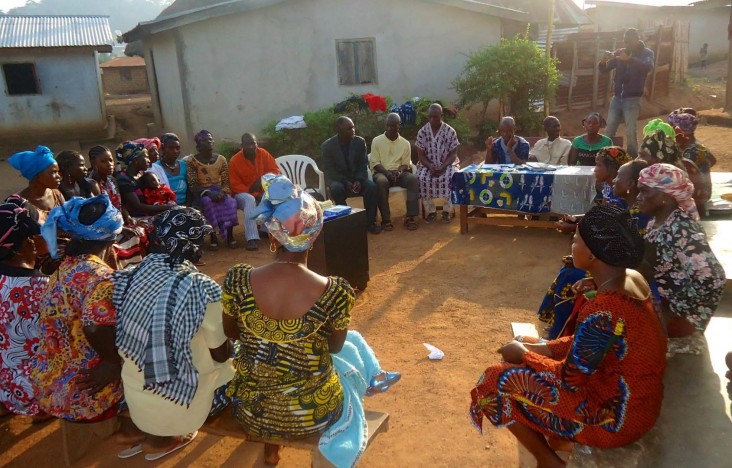
Nov. 2014—Studies have shown that communities living adjacent to forests are among the poorest. Mount Nimba communities in eastern Sierra Leone are no exception. Their dependence on the forest for survival impacts negatively on biodiversity. Timber harvest and charcoal production have been regular activities of the local inhabitants for years. Areas that were previously covered with forests are now deserted and prone to bushfires, all exacerbated by livestock rearing.
The Sustainable and Thriving Environments for West African Regional Development (STEWARD) program, a joint investment of USAID and the U.S. Forest Service-International Programs, is designed to help farmers invest in sustainable natural resource practices that will conserve biodiversity and help families survive. Under the program, the Village Savings and Loan Association initiative was introduced in eight communities around the Nimba Mountains in December 2013.
The initiative is a community-owned savings program with an emphasis on women's empowerment and natural resource conservation. The program promotes the formation of savings and loan groups where individuals contribute a percentage of their earnings from weekly produce sales. From the group's savings, members can access loans to cultivate their individual farms on a larger scale, meaningfully contributing to their families' upkeep and, by extension, to community development. While the funds are managed by group leaders, all decisions are determined through member meetings to ensure trust, transparency and accountability. The loans are payable with 10 percent interest within two months.
The members of the savings groups have also participated in STEWARD-sponsored training to help improve their yields. Through the farmer school concept, farmers learn conservation agriculture techniques and are encouraged to practice vegetable gardening and tree crop planting.
The communities now have more than 240 members, 83 percent of whom are women, currently practicing activities such as vegetable gardening and tree crop plantations (rubber, oil palm, cocoa) instead of traditional economic activities that harmed the environment.
Since December 2013, the association members have deposited more than $11,000 in savings into the groups’ accounts. After a certain period, the money is shared among members based on their individual contributions. They can then use the money to invest in activities that do not harm the environment.
“I used to sell firewood and produce charcoal,” says Francis Camara, a member of a local savings and loan association, “but today, thanks to USAID and STEWARD, I make more money from vegetable gardening."
The STEWARD program promotes regional strategies for biodiversity conservation, improved livelihoods and sustainable natural resource management in the Upper Guinean forest ecosystems of Guinea, Sierra Leone, Liberia and Cote d’Ivoire.
LINKS
USAID’s mission in Sierra Leone
Follow @USAIDWestAfrica, on Facebook







Comment
Make a general inquiry or suggest an improvement.